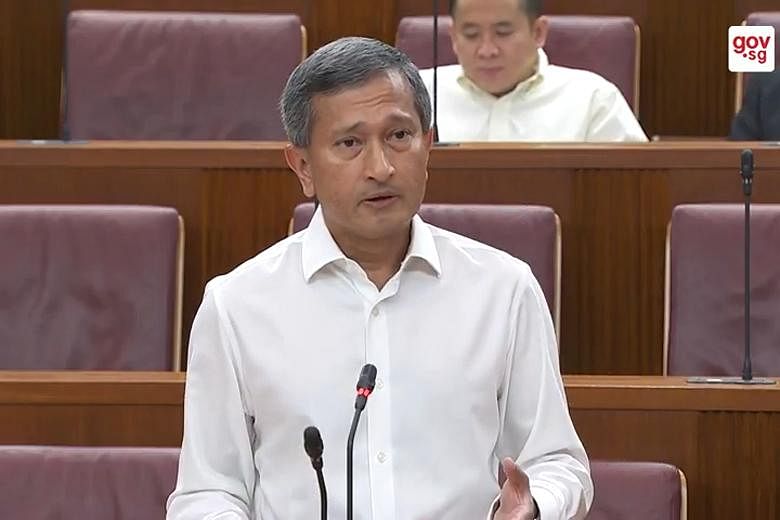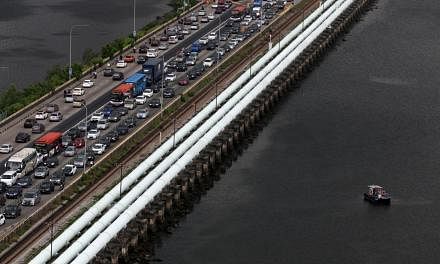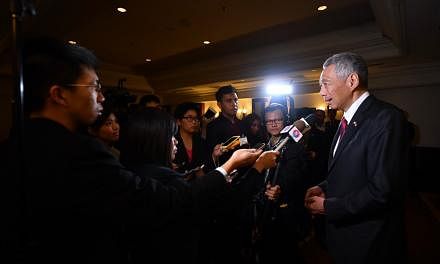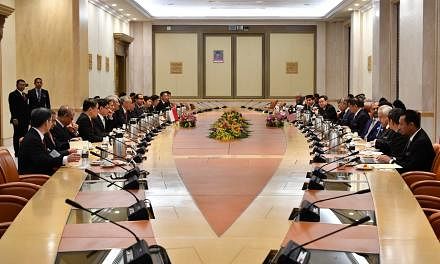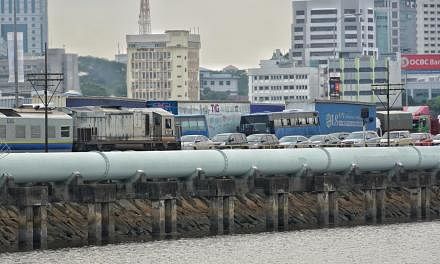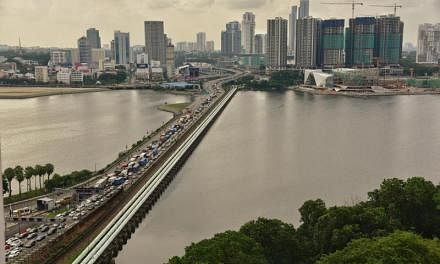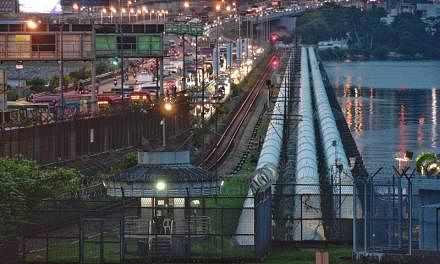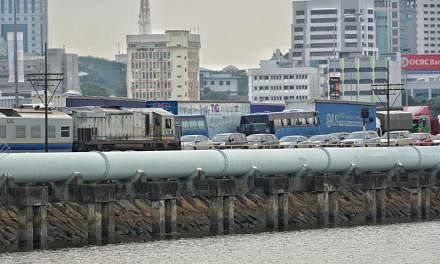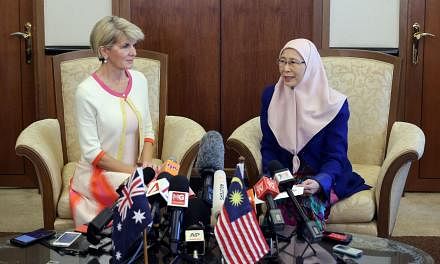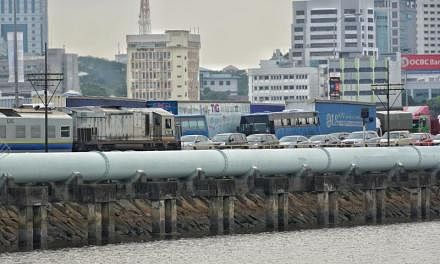SINGAPORE - Singapore will fully honour the terms of the 1962 Water Agreement with Malaysia, including the price of water stipulated in it, and expects Malaysia also to do so, Foreign Minister Vivian Balakrishnan said on Monday (July 9).
Responding in Parliament to a question about bilateral relations with Malaysia, Dr Balakrishnan said the 1962 deal is "not an ordinary agreement".
"The 1962 Water Agreement was guaranteed by both Singapore and Malaysia in the 1965 Separation Agreement, which in turn was registered with the United Nations," he said.
"Any breach of the 1962 Water Agreement would call into question the Separation Agreement, which is the basis for Singapore's very existence as an independent sovereign state."
Water has been in the spotlight in recent weeks as an issue that could affect bilateral ties, after Malaysian Prime Minister Mahathir Mohamad criticised the water supply deal between Singapore and his country, saying the price at which water is sold to the Republic is "ridiculous".
An agreement signed between Singapore and Malaysia in 1962 allows Singapore to draw up to 250 million gallons of raw water from Johor daily at three sen (1.01 Singapore cents) per 1,000 gallons.
Johor Menteri Besar Osman Sapian also commented on the issue last week, saying the state hopes it can raise the price to 50 sen per 1,000 gallons.
In Parliament on Monday, Dr Balakrishnan noted that previous foreign ministers have stated Singapore's position on this issue comprehensively - Professor S. Jayakumar in 2003 and Mr K. Shanmugam in 2014.
"As was stated then, the core issue is 'not how much we pay, but how any price revision is decided upon'," said Dr Balakrishnan, who noted that it was worth reiterating this point.
"Neither Malaysia nor Singapore can unilaterally change the terms of this agreement between our two countries."
Malaysia lost its right to review the price of water under the 1962 agreement in 1987 and, in fact, Malaysia has previously acknowledged that it itself chose not to ask for a review in 1987 as it benefited from the pricing arrangement under the deal, he added.
Johor currently buys treated water from Singapore at 50 sen per 1,000 gallons, as provided for under the 1962 Water Agreement. This is a fraction of the cost to Singapore of treating the water, Dr Balakrishnan noted.
"Hence, in 2002, then PM Dr Mahathir said Malaysia did not ask for a review when it was due as Malaysia knew that any revision would also affect the price of treated water sold by Singapore to Malaysia," he added.
It costs Singapore RM2.40 to treat every 1,000 gallons of water. By selling it to Malaysia at 50 sen, Singapore is giving a subsidy of RM1.90 per 1,000 gallons.
In a booklet on water issues released in 2003, the Singapore government said that while Johor is entitled to buy 17 million gallons of water daily under the 1961 and 1962 water agreements, it bought 37 million gallons. Johor then sells it to its people at RM3.95 per 1,000 gallons, earning a profit of RM3.45 per 1,000 gallons, or RM46 million a year, said the 2003 booklet.
Dr Balakrishnan noted that in 2002, then Johor State Assembly Speaker Zainalabidin Mohd Zain said a review in 1986 of the water price was pointless because Johor relied on Singapore for treated water, and Singapore would have priced it higher for Johor.
The 1961 water agreement lapsed in 2011.
Dr Balakrishnan added that if Malaysia had exercised the right to review the price of water in 1986 and 1987, Singapore might have made different investment decisions on developing the Johor River and its water catchment areas.
For example, he noted, in 1990, Singapore's national water agency PUB and Johor signed an agreement to construct Linggiu Dam to increase the yield of the Johor River to enable reliable extraction of PUB's full entitlement of 250 million gallons of water daily.
Johor owns the Linggiu Dam, but Singapore paid for its construction and operation costs.
Dr Balakrishnan also touched on two other bilateral issues - 1Malaysia Development Berhad (1MDB) and the High Speed Rail (HSR).
While Malaysia's investigations into the 1MDB issue have intensified following its general election, Singapore has been thoroughly investigating 1MDB-related offences committed in Singapore since 2015, he noted.
Singapore has taken firm action against institutions and individuals, including criminal prosecutions, shut down two banks and fined others for regulatory breaches, and jailed and fined individuals convicted on 1MDB-linked charges.
"So far, we are the only jurisdiction to have done so. We have, in addition, cooperated fully with Malaysia's official requests for information on 1MDB-related transactions," he said.
As for the HSR, he said Singapore signed the legally binding HSR Bilateral Agreement (BA) in 2016 in good faith, after both sides had carefully negotiated and agreed to all the provisions, including those pertaining to the implementation of the project, as well as those dealing with the eventuality that the HSR is terminated.
In recent weeks, however, Dr Balakrishnan noted that there have been comments from Malaysian leaders about the HSR, including announcements that a "final decision" has been made to terminate the project, subject to discussions with Singapore, and other statements that the project has been "postponed" or "deferred".
Singapore has sent the Malaysian government a third-person note (TPN) requesting clarification of Malaysia's position but the Malaysian government has not yet replied, he said.
"Singapore is continuing to incur costs on this project as we continue to meet our obligations under the BA, while awaiting Malaysia's clarification. We look forward to an official response to our TPN from the Malaysian government soon."
Should Malaysia cause the HSR project to be terminated, Singapore will deal with the question of compensation from Malaysia for costs incurred in accordance with the BA and international law, he said. "The Singapore Government has a duty to safeguard public funds by recovering these costs."
Dr Balakrishnan highlighted three fundamental principles of Singapore's foreign policy that he said were "especially salient" for its relationship with Malaysia.
The first is upholding international law and respecting the sanctity of international agreements.
"International agreements, solemnly entered into by countries, are sacrosanct and underpin relations between countries," he said, noting that Singapore's very existence as a sovereign independent state is derived from the Separation Agreement of 1965.
International agreements "make it possible for countries to coexist peacefully, build trust and work together for the long term, regardless of changes of governments or circumstances", he said.
"The alternative in which countries can unilaterally revise or abandon terms of agreements is manifestly a recipe for disaster."
Singapore also believes in resolving disputes in accordance with international law, as well as in upholding the country's reputation as a credible, trusted and consistent partner and one that abides fully by its international obligations, Dr Balakrishnan said.
"This is especially crucial as we are an international financial centre."
Note: This article was edited for clarity.
